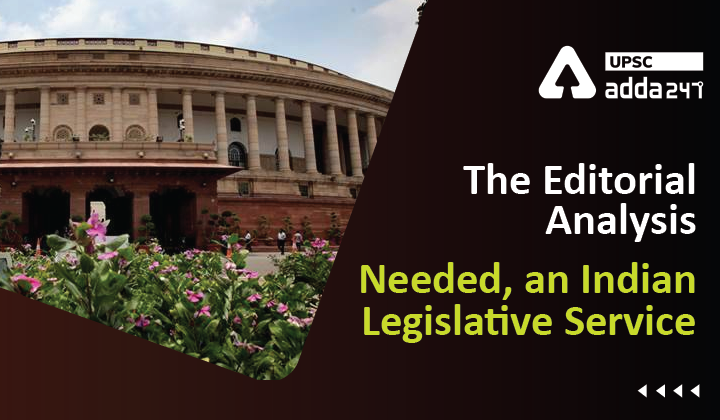Table of Contents
Needed, an Indian Legislative Service- Relevance for UPSC Exam
- GS Paper 2:
- Indian Constitution- Parliament and State Legislatures – structure, functioning, conduct of business, powers & privileges and issues arising out of these.
- Important aspects of governance- Role of civil services in a democracy.
Needed, an Indian Legislative Service in News
- P.P.K. Ramacharyulu was appointment as the Secretary-General of the Upper House by M. Venkaiah Naidu, Chairman of the Rajya Sabha, on September 1, 2021.
- Ramacharyulu was the first-ever Rajya Sabha secretariat staff who rose to become the Secretary-General of the Upper House.
- A precedent — appointing the Secretary-General from ‘outside’ or bureaucracy, often retired — very hard to unfollow was made possible by the Chairman.
- It was both a well-deserving signal for long-serving staff of the Parliament secretariat and course correction to restore the legitimacy of their long-time demand.
- However, Ramacharyulu was replaced, by a former bureaucrat, P.C. Mody, in less than three months.
History of Secretary-Generals of Rajya Sabha
- Since the first Parliament in 1952, 11 Secretaries-General had served in the Rajya Sabha before Ramacharyulu.
- Except for some of the lateral entry staff, who could become Secretaries-General, all the others were from the civil services or other services.
- In the first Parliament, the Rajya Sabha opted for the first Secretary (General) S.N. Mukherjee, a civil servant.
- This was despite India having a legacy of the Legislative Assembly Department (Secretariat) attached to the Central Legislative Assembly since 1929.
- However, S.N. Mukherjee’s appointment as Secretary (General) could be justified as he had served in the Constituent Assembly Secretariat as Joint Secretary and chief draftsman of the Constitution.
- Similarly, Sudarshan Agarwal joined the Rajya Sabha as Deputy Secretary and became the fourth Secretary-General in 1981.
- Since 1993, all the Secretaries-General of the Rajya Sabha were from the civil service till the appointment of Ramacharyulu as the 12th Secretary-General.
- The appointment of P.C. Mody, a retired IRS officer as the 13th Secretary-General in the Upper House was for the first time.
Parliamentary Panel Report on MGNREGA
Key Points about Secretary-General
- Constitutional Backing: Article 98 provides the scope of separate secretariats for the two Houses of Parliament.
- The principle, hence, laid in the Article is that the secretariats should be independent of the executive government.
- Official Rank: The Secretary-General, with the rank equivalent to the Cabinet Secretary, is the third most key functionary of the Rajya Sabha after the Chairman and the Deputy Chairman.
- Perks and Privileges: The Secretary-General also enjoys certain privileges such as freedom from arrest, immunity from criminal proceedings, and any obstruction and breach of their rights would amount to contempt of the House.
- Key Responsibilities: The Secretaries-General of both the Houses are mandated with many parliamentary and administrative responsibilities.
- One of the prerequisites that demand the post of the Secretary-General is unfailing knowledge and vast experience of parliamentary procedures, practices and precedents.
National Youth Parliament Festival 2022
Issues with Civil Servants being appointed as Secretary-General of Parliament
- Past Baggage: Serving civil servants or those who are retired come with long-held baggage and the clout of their past career.
- When civil servants are hired to the post of Secretary-General, this not only dishonours the purpose of ensuring the independence of the Secretariat but also leads to a conflict of interests.
- Breach of Separation of Power: Appointment of civil servants as secretary general breaches the principle of separation of power.
- The officials mandated with exercising one area of power may not expect to exercise the others.
- Compromises Reciprocal Supervisory Nature of Parliamentary Democracy: In a parliamentary polity, one of the roles of Parliament is to watch over the executive’s administrative behaviour.
- In other words, Parliament has all the reasons for its surveillance of administration.
- Parliament must have the technical and human resource competency that is on a par with the executive to be an effective body for providing meaningful scrutiny and to make the executive accountable.
- A strong Parliament means a more answerable executive.
- However, the bureaucracy persistently does not allow Parliament to be a competent and robust legislative institution.
Way Forward- Constituting an Indian Legislative Service
- Need for an Indian Legislative Service:
- Mammoth Law-Making Bodies: There are thousands of legislative bodies in India, ranging from the panchayat, block panchayat, zila parishad, municipal corporations to State legislatures and Union Parliament at the national level.
- Despite these mammoth law-making bodies, they lack their own common public recruiting and training agency at the national level.
- Creating an Indian Legislative Service: A common Indian Legislative service can build a combined and experienced legislative staff cadre, enabling them to serve from across local bodies to Union Parliament.
- Presently, the Parliament and State legislative secretariats recruit their pool of bureaucrats separately.
- Ensuring competent and robust legislative institutions demands having qualified and well-trained staff in place.
- Constitutional Provision: The Rajya Sabha can, under Article 312, pass a resolution, in national interest, to create an all-India service common to both the Union and the States. This enables Parliament to create such a service by law.
Conclusion- Creating an Indian Legislative service
- In the United Kingdom, the Clerk of the House of Commons has always been appointed from the legislative staff pool created to serve Parliament. It is high time that India adapts and adopts such democratic institutional practices.
President’s Address to the Joint Sitting of Parliament





 TSPSC Group 1 Question Paper 2024, Downl...
TSPSC Group 1 Question Paper 2024, Downl...
 TSPSC Group 1 Answer key 2024 Out, Downl...
TSPSC Group 1 Answer key 2024 Out, Downl...
 UPSC Prelims 2024 Question Paper, Downlo...
UPSC Prelims 2024 Question Paper, Downlo...





